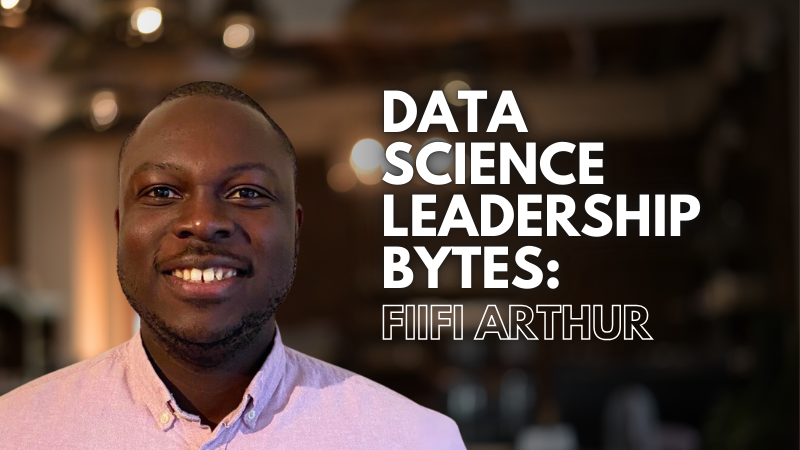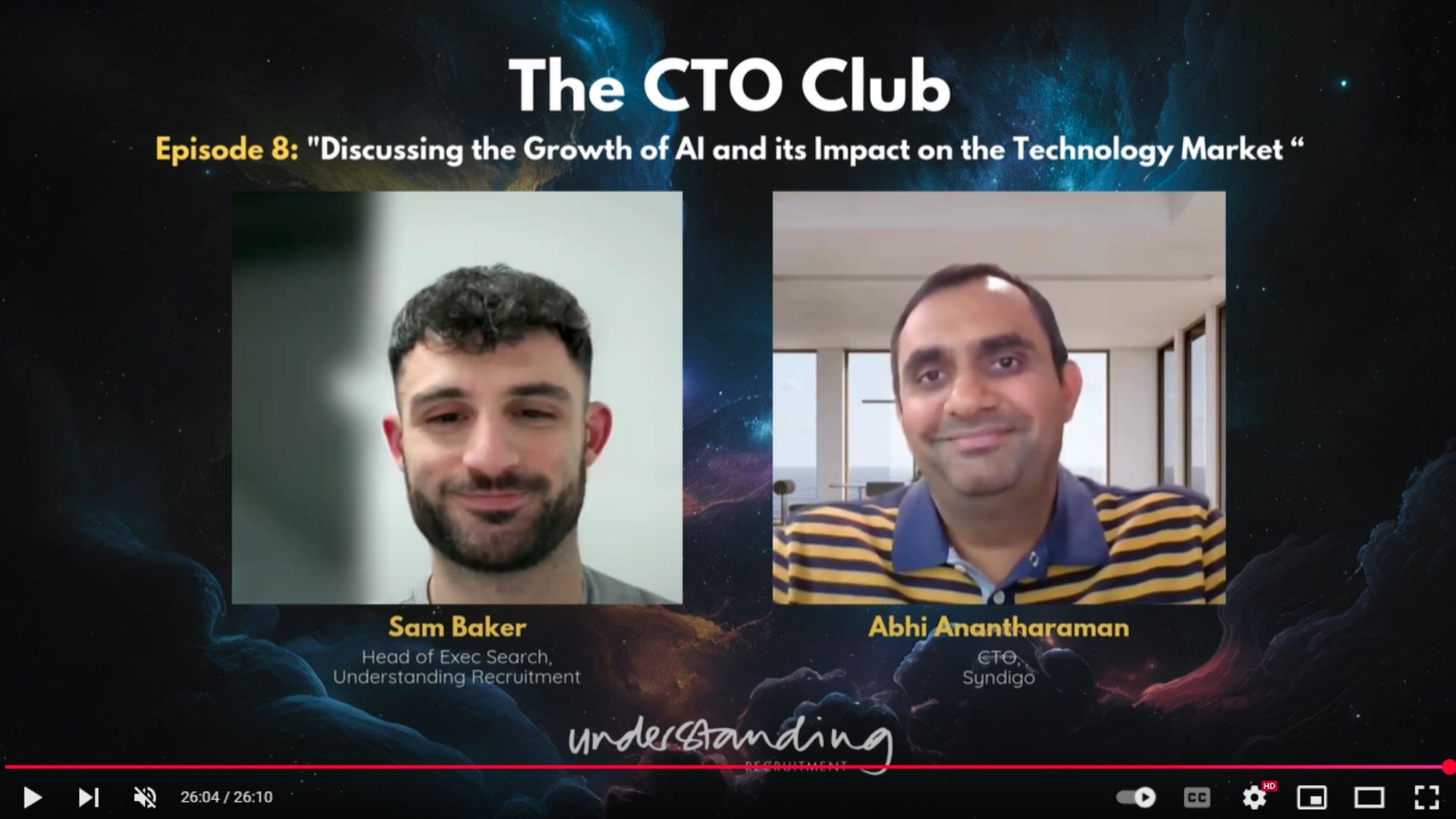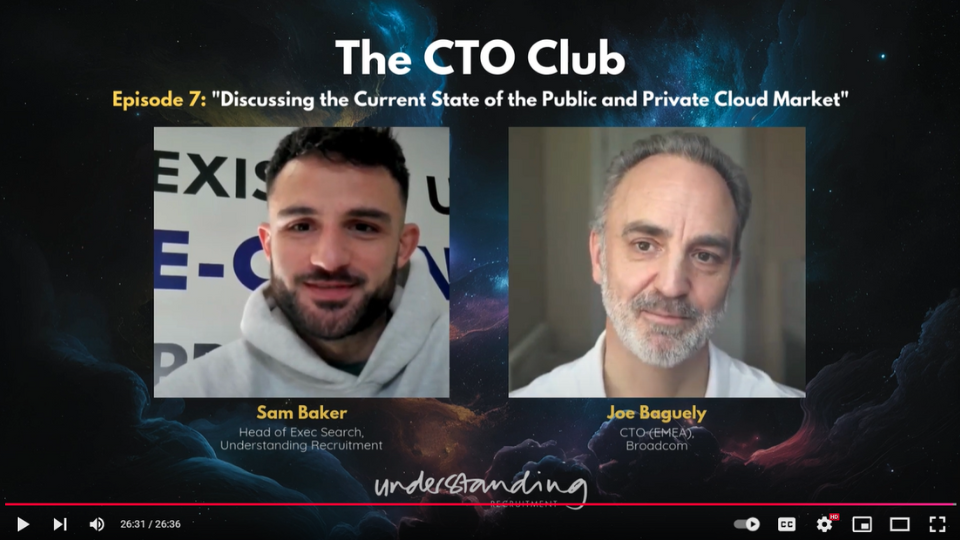Data Science Leadership Bytes: In Conversation With Fiifi Arthur
24th April, 2024 5 min
In the second instalment of our Data Science: Leadership Bytes series, we turn our focus to Fiifi Arthur, Data Science Subject Matter Expert & Leader at Direct Line and a self-proclaimed aficionado of data science, leadership, and tennis.
As we delve further into Fiifi's story, we'll discover how his ten-year career journey and his deep love for leadership come together.
How did you get into a career in Data Science?
Initially, I actually wanted to be an Investment Banker. I started out studying Financial Mathematics at University where I did a lot of statistics and modelling, loved finance and really wanted to understand how people made money. I then got the opportunity to work in a trading firm but when the firm was acquired, I moved to a consulting firm. At this time Data Science was becoming such a big buzzword so I sought advice from the Chief Data Science Officer internally and saw the crossover. I realised how much I enjoyed building something with my own hands and creating something to have a real business impact. Data Science gave me that opportunity. From there, I learnt Python in two weeks, started building projects, used Kaggle and fell in love with it. Coding on my way to work, on weekends, and going to meet-ups where people were discussing Data Science - that’s when I knew what I wanted to do for the rest of my career.
From then to now, what would you say are the most transformative moments or particular highlights in your career?
I joined Capgemini when there were 50-60 Data Scientists in Data Practice which meant that with any type of model or solution, someone in the business had done it. It was the first community I’d been in where I felt I could learn from everyone. That experience alone blew my mind. For someone like me who’s a self-confessed Data Science addict, the learning opportunity was absolutely amazing.
From a leadership perspective, my role at ERS, was one of my first senior leadership positions, moving from technical leadership to more business leadership, the learning curve around the business leadership was enormous and was a pivotal shift in my career.
What are the biggest challenges that Data Scientists face right now?
I think this differs across levels of seniority. For leaders, it’s how to manage change. How do you get business leaders to open their minds to change and try something different? It comes down to being a salesperson and how you can convince someone to have a different perspective on things.
At a more hands-on level, learning to adapt to speak with non-technical audiences to get your points across. Without this skill, it can hinder how viable your solutions can become if you can’t cross-communicate or communicate with cross-functional teams.
What advice would you give to someone looking to improve softer skills, such as business acumen and engaging with non-technical leaders?
Ask for feedback! I asked the Product Managers on my project for feedback. They told me I spoke too fast. That’s because I’m used to speaking to technical people. So now I have taken this on board and have “everyday Fiifi” and “presentation style Fiifi”. To develop this I put myself out there to improve on areas I know needed developing e.g. speaking on podcasts, delivering presentations at conferences, sitting on panels, and speaking to different audiences.
What excites you most about recent developments and advancements?
Well, there’s no way you can ask this question and we not talk about GenAI! Data Science as a field is quite mainstream and mature now, but some of the recent developments like GenAI better acknowledge Data Science that can help businesses.
CEOs with ChatGPT and chatbots now understand the use cases of Data Science and how it works and can help their day-to-day life. In comparison to 5-6 years ago speaking with business leaders about Data Science, they would ask “What’s this magical thing that you do?”, “Why do you need the volume of data that you do?”.
I still think business leaders don’t understand AI and Data Science however, if we’re talking about ChatGPT or computer vision like iPhones; how you can unlock your iPhone with facial detection – all of that is making AI more accessible and the more this happens, the more interest people will have and welcome it.
What advice would you give to your younger self?
Be selective over what companies you work for. I’ve had roles in my career that are shorter than I would have liked but that was because I didn’t understand what the business was trying to achieve. Upon reflection, I should have done more in-depth research about where the business was at, the level of Data Science maturity and whether I’d be able to make an impact. I think those types of investigations are crucial. For example, if a business doesn’t have a path to deployment for Data Science models, and they are not willing to invest, there is no business benefit that can be achieved from Data Science models in production.
What are the most important skills for future Data Science leaders to develop?
Up to a Lead Data Science level, I think you can get away with having good technical skills, good communication skills, being able to explain to senior stakeholders the work that you’re doing and being able to guide a small team. When you get to the Head Of or Director level, the expectation is more. You need to translate yourself from a technical leader to a business leader. Your job is to influence people at an executive level for budget and resource approval, approve projects and open doors for your team to shine. The only way you can do that is with business understanding and sales skills with almost that political skillset with oratory skills to convince, sell, and influence.
That transition isn’t something you can read about in a textbook. Get guidance, mentors, and coaching, see who does it well and adapt to your style. Not just through numbers and stats because that’s what we’re good at but through relationships and understanding of the business.
What advice would you give to businesses struggling to attract and retain diverse talent?
This is hard to achieve, and I’ve had my own struggles. I’m a black minority and that poses a challenge in itself.
I once interviewed for a company that had just white males on the website and one female. I knew I wouldn’t feel comfortable working there, there’s no diversity. Their response was "Well you can be the first person" to which my response was "I don’t want to be the token black guy".
Businesses need to show that they take proactive steps in promoting diversity in today’s landscape not just going out to hire for diversity. When hiring for diversity, people don’t feel welcomed, but if you already have diverse thoughts and diverse events and live out what you’re preaching, then naturally you’re going to attract diverse talent. Make sure it’s not just words on your company website but actions and how you operate in the little things like the events you run, e.g. International Women’s Day events coupled with things like supportive returning to work after maternity policies. There are other things that you can do for example support a local charity that runs internships for ethnic minorities to join your business, and run job placements where people from ethnic minorities can get work experience. If you’re really struggling, hire an ED&I person.
Ultimately, it comes down to caring to lead. To lead people well, which is what CEOs want to do, you have to care about people and when you start to care about people you’ll start to know more about them. The more you know about them, the more you’ll be able to put policies in place that will benefit them, make them happier and stay in your company for longer.
Bonus Question: What is your number one interview tip?
Be confident in who you are, be confident in the value you bring to the table, and be confident in your experience to date because if they’ve invited you to interview, there’s something they see in you and are curious about who you are.
Practice your storytelling. A lot of the time you have to demonstrate your skillset so having clarity on projects, situations and examples of where you’ve influenced/led/added value. Get them excited!
Don’t be afraid to interview them as well!
If you're looking for exceptional talent in data science or seeking exciting career opportunities, our dedicated Data Science recruitment team is here to help. We connect businesses with skilled professionals and offer a platform for individuals to explore promising roles in data science. Whether you're hiring, browsing job listings, or interested in being featured in our blog series, we're here to support your journey in the world of data science. Contact us today to learn more!



